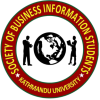ABOUT DEpartment
The Department of Management Informatics and Communication (DoMIC) is a multidisciplinary department for management, communication and information focused programs at University’s main campus. It aims to launch new graduate and post-graduate programs of inter- and/or multi-disciplinary nature, in collaboration with different Schools and programs of the University; and create opportunities for local scholars (educated circle) through exposure to higher-level professional training and continuing education, so that a greater community of adult workforce owns and joins the vision, mission and initiatives of Kathmandu University.
MIC monitors the existing management and communication-related courses, and runs the Bachelor of Business Information Systems (BBIS) and Masters of Philosophy (MPhil) in English Language Education program at the University’s central campus, Dhulikhel.
Structure
DoMIC comprises two key disciplinary domains (‘Management Informatics’ and ‘Communication’) with three focus areas: Management, Informatics and Communication. This combination represents its growth potentials as a department working with and through three intersecting disciplines (Figure 1 below), at the core of which remain the BBIS (Bachelor of Business Information System) program and programs that fall under its scopes and potentials.
- The aspect of Management broadly involves the current/immediate academic engagements across business management, entrepreneurship development, financial management, economics for technology, technology management, business incubation, organizational development and professional ethics, among others.
- The dimension of Informatics covers such areas as management information system, financial technology, data analytics, quantitative techniques, computer applications, information management, cognitive psychology and linguistics.
- The aspect of Communication represents the services and teachings pertaining to areas as diverse as scientific writing, soft/social skills, professional development, interactive language lab, managerial communication, logic, critical thinking, publication support, guidance and counselling, research methodologies, critical pedagogy, literary and cultural scholarship.
Figure 1: DoMIC as an Interdisciplinary Entity
Functional Position
The functional position of DoMIC under SoM will be as shown in Figure 2 below – at the center of multiple Schools and programs with varying academic and administrative proximities. The administrative position under SoM is suggested after thorough analysis of DoMIC’s academic scopes and service potentials. The priority of DoMIC will involve running its own academic programs while providing services to (or collaborating with) relevant Schools, Departments and programs as necessary.
Figure 2: Functional Position of DoMIC
Diversified Involvement
- Management of Guidance and Counselling Cell since March 2018
- Korean language teaching through a KOICA sponsored volunteer, since 2010
- Communication services to the central administration, faculties and research scholars,
- Training faculties and staffs in pedagogy and communication skills
Service Potentials
- Writing Center: A functional unit will be established in the DOMIC to support students (mostly undergraduate final year and graduate) to enhance and develop their academic writing skills. The Center will avail professional communication services to staffs and faculties as well.
- Continuous Learning Center: DoMIC can launch short-term packages on teacher training and continuous education in collaboration with School of Education (SoEd).
- Elective or Non-credit Courses: Courses like Strategic Communication, Financial Management, Philosophy and Discourse, Public Relations, Literary Studies (English/Nepali), among others, can be offered as electives in the programs of SoE and SoS.
